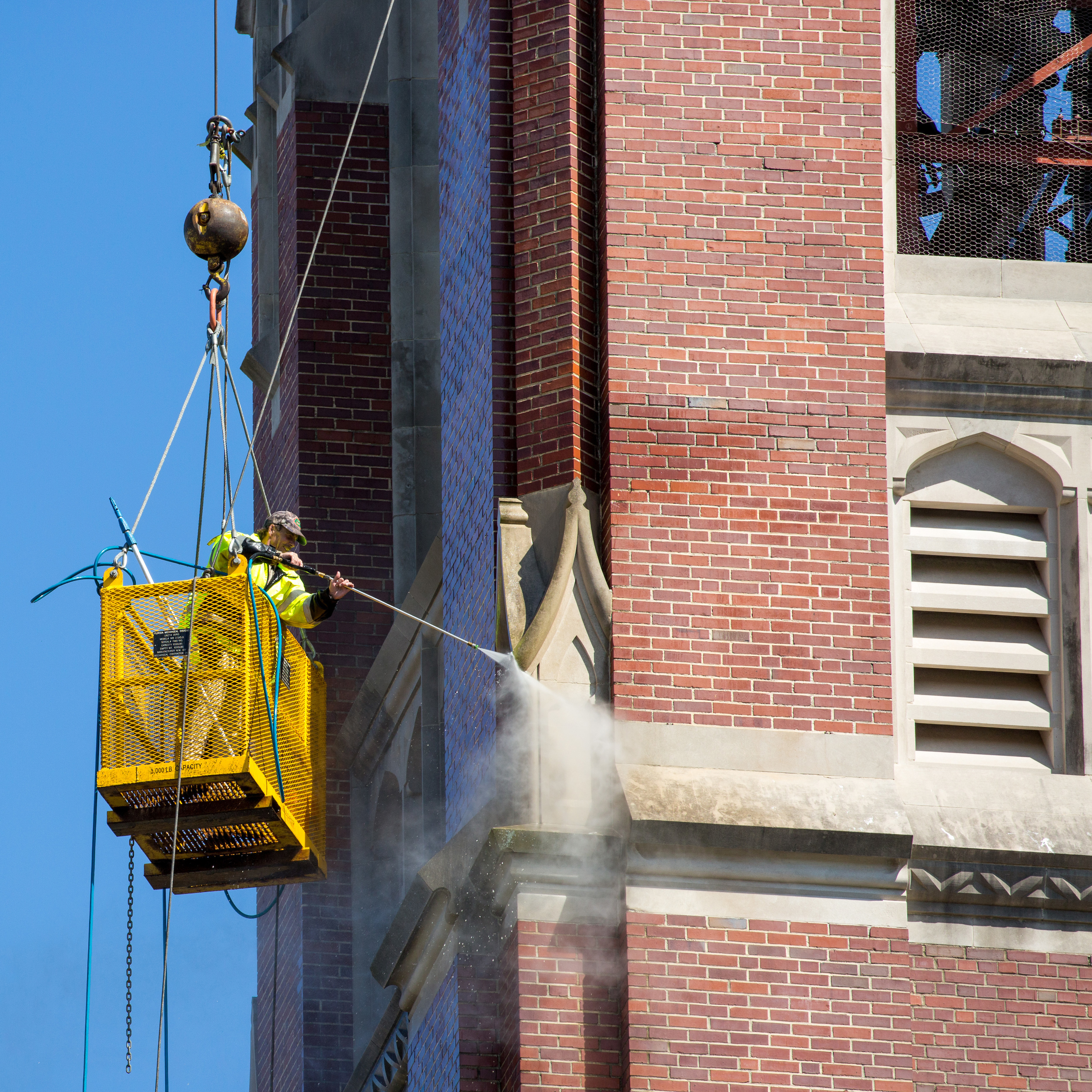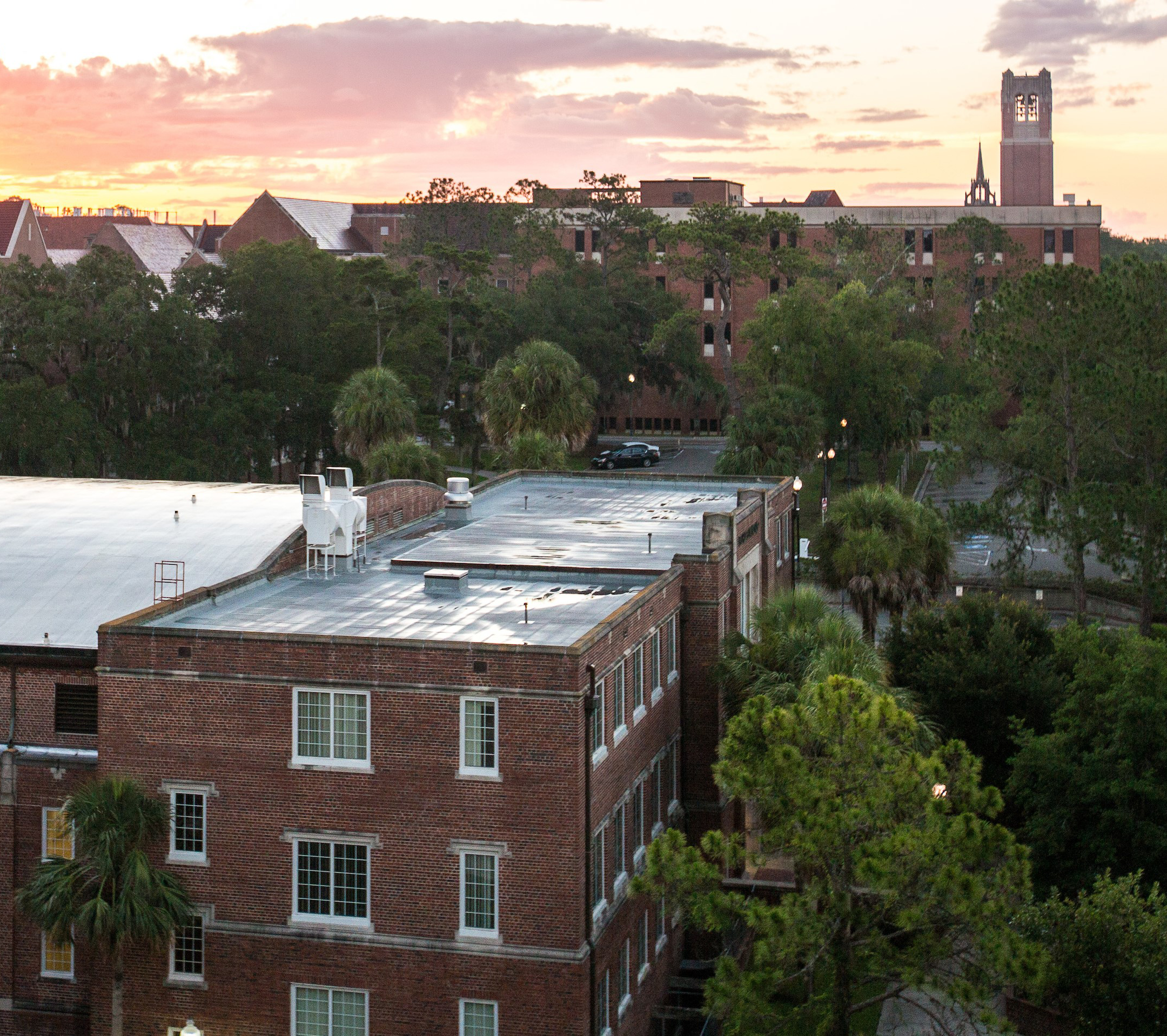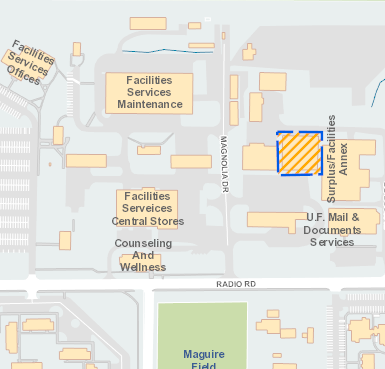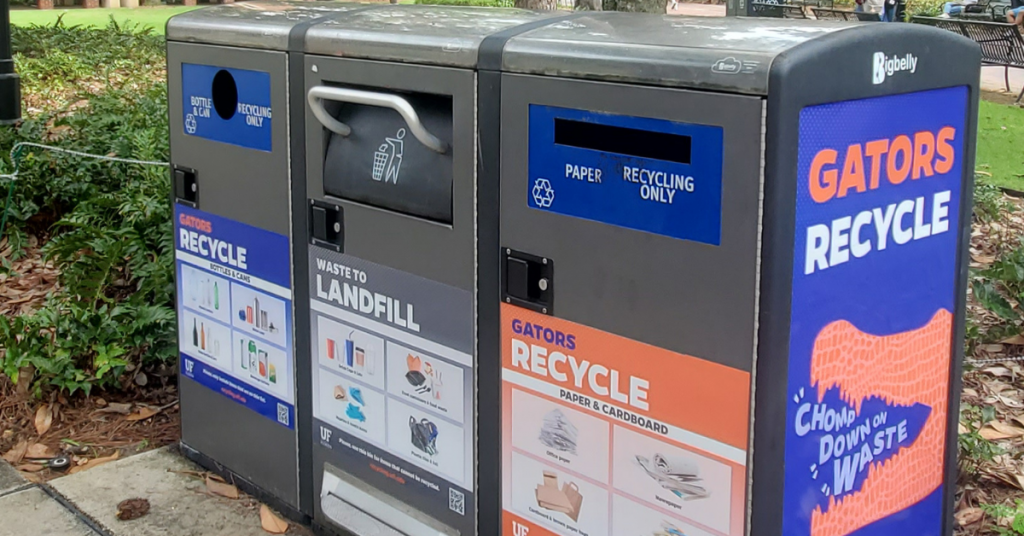
GOAL: Divert 90% of Uf waste from landfills
The Facilities Services Recycling and Solid Waste Management Office manages the collection and disposal of all solid waste from University of Florida operations. We continually work toward better ways to reduce, reuse and recycle campus waste through sustainable practices.
We are thrilled you made your way to this page to begin the conversation on waste!
If you are looking for detailed information on recycling a certain material at UF, visit our Recycling Guide.
If you have a specific question, jump to the Recycling FAQ.
Recycling success at UF
Join us in celebrating our achievements and continuing the journey to divert 90% of UF waste from landfills.
Remarkable milestones include:
- Over 300,000 tons of organics and food waste have been diverted from the landfill through the composting initiative.
- 162 tons of bottles and cans recycled.
- Over 100 tons of paper and cardboard are recycled on average each month.
current projects & initiatives
Through these efforts, we aim to educate and engage students, faculty, and staff in meaningful practices that contribute to waste reduction and resource conservation.
- Florida Fresh Dining is styrofoam-free. Eliminating the use of styrofoam provides a healthier campus environment for all.
- Florida Fresh Dining is plastic bag-free. Eliminating the use of plastic bags promotes an environmentally responsible culture on campus.
- Procurement Directive. UF’s purchasing directives support the purchase of commodities and services that will minimize any negative environmental impacts of its work.
recycling overview
UF, Gainesville, and Alachua County all use a dual-stream recycling system. This means that paper/cardboard products are collected separately from glass, metal, and plastic.
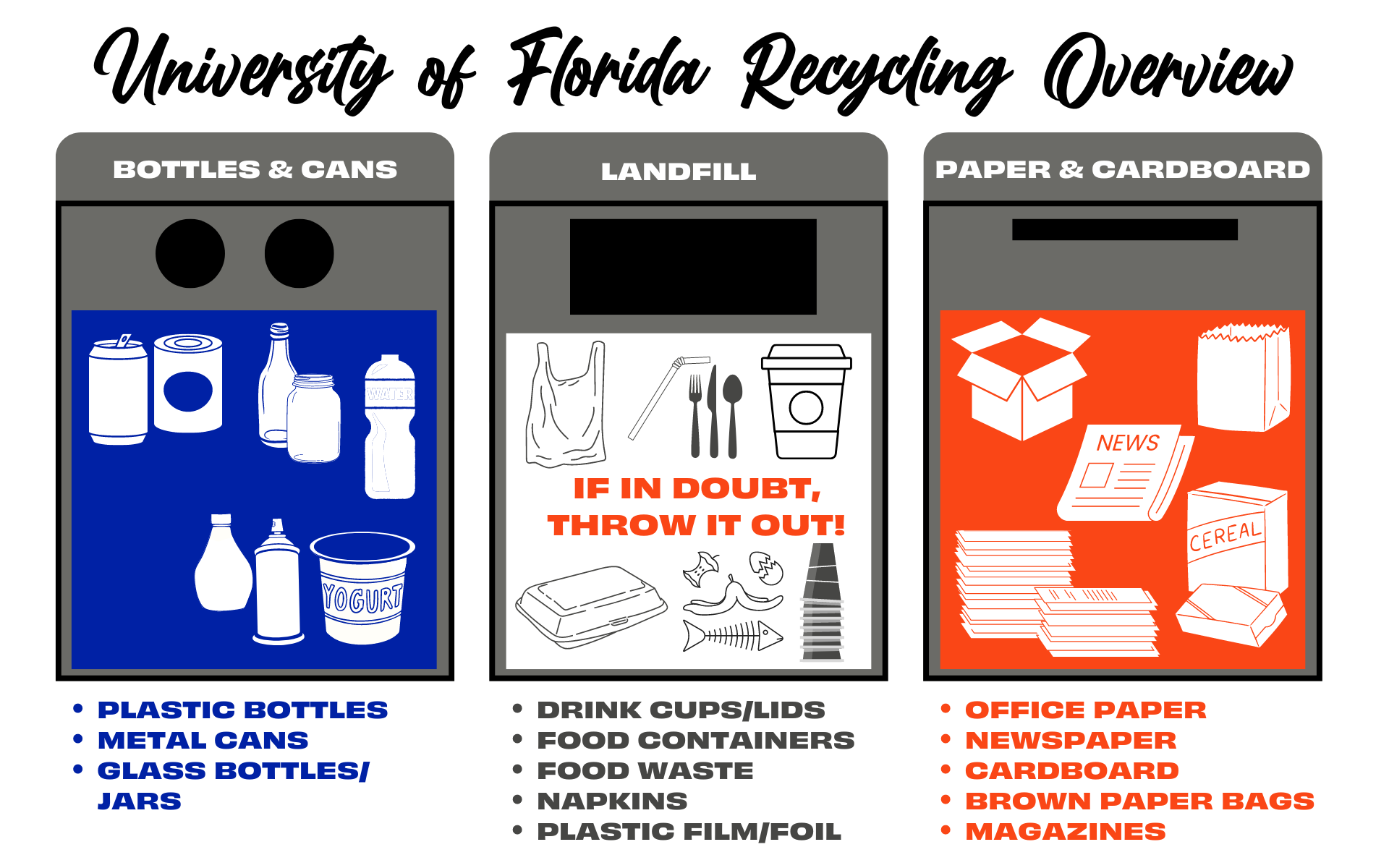
For detailed information on individual items pictured above, please visit the Recycling Guide.
ON-CAMPUS
For in-depth information about recycling on campus for UF students, faculty, and staff, visit the Recycling on Campus Overview:
Recycling On-Campus
OFF-CAMPUS
All recycling in the City of Gainesville and Alachua County is taken to the Leveda Brown Environmental Park. However, there are some differences in off-campus recycling and waste services vs. those available on the UF campus. If you are off-campus, plan to review the resources and policies that apply for waste disposal and recycling.
Resources:
Recycling faq
Recycling is complex and requires an investment of time and effort to maximize the process. Review the FAQs below to assist you in understanding the recycling systems in place at UF and in the greater Gainesville community.
Is styrofoam recyclable?
No, styrofoam is unfortunately not recyclable. Please note that Florida Fresh Dining is styrofoam-free.
UF’s Sustainable Procurement Directive also recommends that the campus community purchase products that will minimize negative impacts on society and the environment to the greatest extent possible.
What goes into the landfill bins?
Anything not specifically listed as recyclable! A saying you can use is: “If in doubt, throw it out.”
This is better for the recycling system than “wish-cycling.” Wish-cycling is the practice of putting items into the recycling bin with the hope or assumption that they are recyclable, even if they may not be accepted by the local recycling facility. It occurs when well-intentioned individuals make decisions based on their desire for an item to be recycled rather than adhering to the specific guidelines provided by their local recycling program.
When items that are not able to be accepted for recycling (a.k.a. contaminants) are placed in the recycling, it increases the cost of processing recyclables and can damage the sorting equipment. Contaminants also lower the quality of the recyclables, thus decreasing the market value of the recycled materials.
Should plastic or glass bottle caps be removed prior to being recycled? Should I flatten soda cans?
Yes! Smaller lids, such as bottle caps and water bottle lids, should be removed and disposed of with your garbage. These bottle caps and lids are made of different materials that are not recyclable in our system and can jam the equipment.
Larger metal lids from glass jars can be rinsed off and placed back on once containers have been fully emptied.
Larger plastic lids from laundry detergent bottles and plastic tubs can be placed loose in the recycling bin.
There is no need to flatten any aluminum or plastic bottles or containers unless you’re trying to conserve space.
Do I have to rinse out my recyclable containers before placing them in the bin?
It is best if you are able to rinse them out before recycling them. Please prioritize dumping out your containers before recycling them so staff does not have to deal with leaks and extra clean-up.
If the plastic that I am trying to recycle doesn't have a number on it, can I still recycle it?
It depends. Almost all plastic containers have a number inside of the classic chasing arrows recycling symbol.
However, the chasing arrows symbol with a number does not indicate that the material is actually recyclable in all systems – it’s merely an indicator of the type of plastic!
In Alachua County, the City of Gainesville, and on UF’s main campus, the following plastics are the only plastic items recyclable:
- Plastic Bottles
- Plastic Jugs (such as juice, milk, or detergent containers)
- Plastic Tubs (such as yogurt, butter, or sour cream containers)
What can be composted at UF?
Compost bins can be found in restrooms in select buildings on campus. These bins are specifically designed to collect the brown paper towels available for use in these restrooms.
For more information about composting, visit the Office of Sustainability.
Where does UF's recycling go?
Did you know that
ALL recycling in the City of Gainesville and Alachua County, including UF’s recycling, is taken to the Leveda Brown Environmental Park? At the
Leveda Brown Environmental Park, the recycling is sorted and then sold or given away to secondary processors and manufacturers so they can be used to make new products.
The City of Gainesville provides detailed information about where specific materials are sent after sorting.
How can I get recycling bins?
It varies depending on the location and the type of bin that you need!
Office: please reach out to your custodial staff and they can get cardboard boxes for you to use to collect your paper recycling.
Indoor Communal Areas & Outdoor Recycling: please call Recycling and Solid Waste Management at 352-392-7396 or email the Recycling & Solid Waste Coordinator at cbruno@ufl.edu.
Event Recycling: please complete the Request for Equipment and Services form.
Note that some areas of campus such as Housing, The University Athletic Association, Florida Fresh Dining, and UF Health Shands have different contacts, policies, and procedures for recycling.
How can I recycle off-campus?
- The City of Gainesville outlines clear guidelines for its Recycle Collection. If you do not have a bin, residential recycling bins are available by request in service areas.
- Unfortunately, apartment complexes cannot always offer individual collection bins. Please contact your apartment complex directly to understand the recycling collection procedures in place at your apartment.
How can I recycle my electronics?
All UF-purchased electronics must be disposed of through UF Surplus/Asset Management.
Personal electronics can be recycled in a variety of ways:
- Drop off at the Alachua County Households Hazardous Waste Collection Center at the Leveda Brown Environmental Park.
- For homes serviced by the City of Gainesville Residential Curbside Program, you can request an appointment for the collection of larger electronics.
- Select electronic stores and retailers may accept small electronic devices for recycling such as computers, laptops, tablets, and cell phones. Examples include Best Buy, Staples, Apple, Google, and Samsung – we recommend that you call ahead or check online to confirm current policies, as these types of programs frequently change.
- If your electronics are still in working condition, you may consider donating them to a local non-profit organization, educational/arts program, thrift store, resale store, etc.
What can I do with old, used, or unwanted clothing?
Make sure your clothing is clean and in good condition. We recommend that you call ahead or check online to see what items are accepted before visiting any of the following locations:
Please reach out to the Office of Sustainability with any additional waste-related questions. We will be happy to direct you to the correct person for your specific needs.





